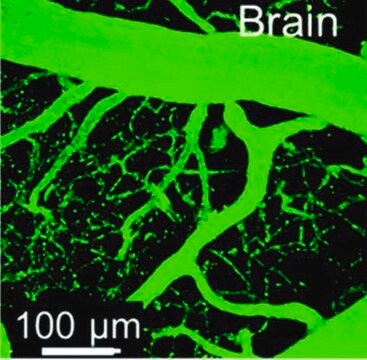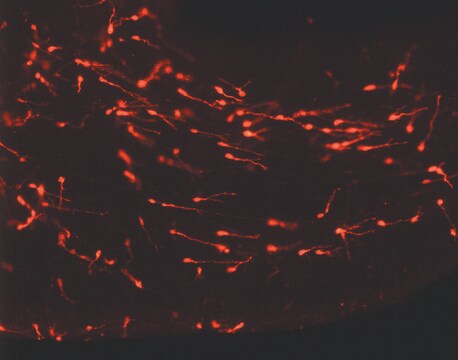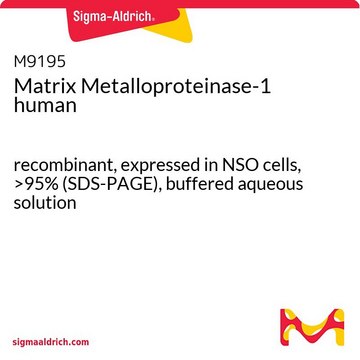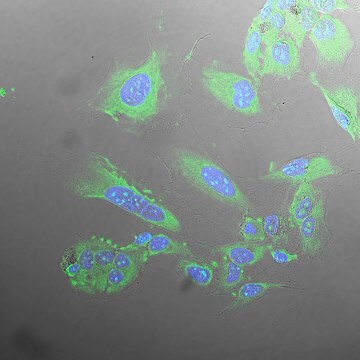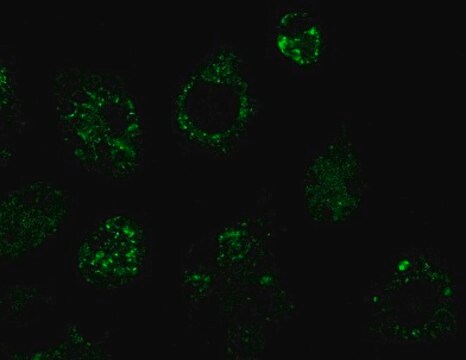SCC253
WB-F344 Rat Liver Progenitor Cell Line
Iniciar sesiónpara Ver la Fijación de precios por contrato y de la organización
About This Item
Código UNSPSC:
41106514
NACRES:
NA.81
Productos recomendados
origen biológico
human
Nivel de calidad
envase
vial of >1X10⁶ cells
fabricante / nombre comercial
Millipore
modo de crecimiento
N/A
técnicas
cell culture | mammalian: suitable
Condiciones de envío
liquid nitrogen
temp. de almacenamiento
−196°C
Aplicación
- Each vial contains > 1X106 viable cells.
- Cells are tested negative for infectious diseases by a Mouse/Rat Comprehensive CLEAR Panel by Charles River Animal Diagnostic Services.
- Cells are verified to be of rat origin and negative for inter-species contamination from mouse, human, chinese hamster, Golden Syrian hamster, and Non-human Primate (NHP) as assessed by a Contamination Clear panel by Charles River Animal Diagnostic Services
- Cells are negative for mycoplasma contamination.
Among adult organs, the liver has the unique ability to regenerate after injury, a feature that has generated a high level of interest in liver progenitor cells for therapeutic uses. Liver progenitor cells (also known as oval cells) have potential to differentiate into either of the two epithelial cell types in the liver, biliary epithelial cells or hepatocytes.1 The inherent versatility and clinical applicability of liver progenitor cells highlight the importance of cellular models for this cell type.
WB-F344 is a highly cited, spontaneously immortalized rat liver progenitor cell line. WB-F344 cells are derived from adult tissue yet have the characteristic phenotype of oval cells and proliferate rapidly.3 WB-F344 cells express markers of liver progenitor cells, including EpCAM, Thy1, and α-fetoprotein.3 WB-F344 cells are non-tumorigenic, but can undergo neoplastic transformation both in response to treatment with carcinogenic agents4 and spontaneously when maintained in a post-confluent state.5 The WB-F344 cell line is a well-established and versatile model for studies of liver cell renewal, differentiation, and origination of hepatic cancers.
Source
WB-F344 rat liver progenitor cell line was isolated from the liver epithelium of an adult Fischer-344 rat.2
References
1. Int J Exp Pathol 2005, 86(1): 1-18.
2. Stem Cells Cloning 2010, 3: 39-47.
3. Exp Cell Res 1984, 154(1): 38-52.
4. Am J Pathol 1989, 135(1): 63-71.
5. Am J Pathol 1998, 153(6): 1913-1921.
WB-F344 is a highly cited, spontaneously immortalized rat liver progenitor cell line. WB-F344 cells are derived from adult tissue yet have the characteristic phenotype of oval cells and proliferate rapidly.3 WB-F344 cells express markers of liver progenitor cells, including EpCAM, Thy1, and α-fetoprotein.3 WB-F344 cells are non-tumorigenic, but can undergo neoplastic transformation both in response to treatment with carcinogenic agents4 and spontaneously when maintained in a post-confluent state.5 The WB-F344 cell line is a well-established and versatile model for studies of liver cell renewal, differentiation, and origination of hepatic cancers.
Source
WB-F344 rat liver progenitor cell line was isolated from the liver epithelium of an adult Fischer-344 rat.2
References
1. Int J Exp Pathol 2005, 86(1): 1-18.
2. Stem Cells Cloning 2010, 3: 39-47.
3. Exp Cell Res 1984, 154(1): 38-52.
4. Am J Pathol 1989, 135(1): 63-71.
5. Am J Pathol 1998, 153(6): 1913-1921.
Características y beneficios
The WB-F344 cell line is a well-established and versatile model for studies of liver cell renewal, differentiation, and origination of hepatic cancers.
Almacenamiento y estabilidad
The cells should be stored in liquid nitrogen until use. The cells can be cultured for at least 10 passages after initial thawing without significantly affecting functionality.
Otras notas
This product is intended for sale and sold solely to academic institutions for internal academic research use per the terms of the “Academic Use Agreement” as detailed in the product documentation.
Cláusula de descargo de responsabilidad
Unless otherwise stated in our catalog or other company documentation accompanying the product(s), our products are intended for research use only and are not to be used for any other purpose, which includes but is not limited to, unauthorized commercial uses, in vitro diagnostic uses, ex vivo or in vivo therapeutic uses or any type of consumption or application to humans or animals.
Código de clase de almacenamiento
12 - Non Combustible Liquids
Clase de riesgo para el agua (WGK)
WGK 2
Punto de inflamabilidad (°F)
Not applicable
Punto de inflamabilidad (°C)
Not applicable
Certificados de análisis (COA)
Busque Certificados de análisis (COA) introduciendo el número de lote del producto. Los números de lote se encuentran en la etiqueta del producto después de las palabras «Lot» o «Batch»
¿Ya tiene este producto?
Encuentre la documentación para los productos que ha comprado recientemente en la Biblioteca de documentos.
Nuestro equipo de científicos tiene experiencia en todas las áreas de investigación: Ciencias de la vida, Ciencia de los materiales, Síntesis química, Cromatografía, Analítica y muchas otras.
Póngase en contacto con el Servicio técnico